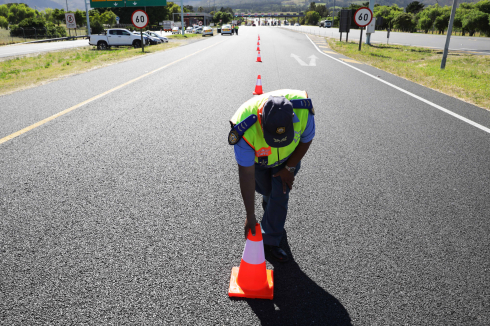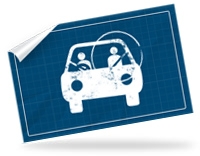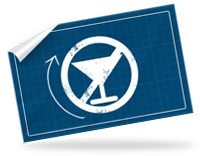Last week, 64 people were arrested by Western Cape Provincial Traffic officers on suspicion of driving under the influence of alcohol. During the same period, 15 pedestrians were killed in traffic crashes in our province.
News
Latest news, speeches, media alerts and publications.

Provincial Traffic promotes good driver behaviour to prevent trauma and reduce pressure on health system / 11 August 2021
Western Cape Provincial Traffic Services continue to work around the clock, implementing our 365-day approach towards road safety through well-structured and integrated operations throughout the province.
While the province is simultaneously monitoring the number of trauma admissions to our hospitals during the third wave peak, contingency measures and protocols have been put in place to address all current changes to the regulations. Road crashes must not be allowed to add more pressure to the health system that is already under pressure.
Provincial Traffic Officers continue to selflessly serve motorists during these trying times to make sure that all road users practise good driver behaviour, comply with the rules of the road, stay within the legal speed limits and observe adequate rest periods during travel in order to avoid fatigue.
Provincial Traffic Services implemented a total of 191 integrated roadblocks, vehicle check point and speed control operations across the province in the week of 2 to 9 August 2021, and 21 382 vehicles were stopped and checked. These statistics include figures of the past long weekend.
The Directorate: Traffic Law Enforcement and the South African Police Service continue to refine the joint plan to deal with possible incidents of public and taxi-related violence that could have an impact on daily life, the safety of motorists and commuters, traffic flows, and the ability of motorists to access transport routes. The plan seeks to heighten law enforcement visibility, monitor all major and national routes for potential threats and risks, and enable a rapid response to any incidents.
The primary focus of Provincial Traffic Law Enforcement remains promoting good driver behaviour, clamping down on road traffic offences, and public compliance with the Disaster Management Act.
A total of 257 speeding offences were recorded and 3 826 fines were issued for various traffic violations ranging from driver to vehicle fitness in the total amount of R3 482 650.
Forty-four vehicles were impounded and 99 were discontinued for unroadworthiness. The highest speed recorded was 161 km/h in a 120 km/h zone.
A total of 32 charges were laid under the Disaster Management Act and fines to the total value of R34 400 were issued. 65 arrests were made for various offences under the National Road Traffic Act, Criminal Procedure Act, and Disaster Management Act regulations. The arrests include 32 people arrested for driving under the influence of alcohol, 8 for speeding and 12 for possession of fraudulent documentation amongst others.
A total of 20 crashes occurred in the reporting period, and 27 fatalities were recorded. They include 14 pedestrians, 7 passengers, 3 drivers, 1 cyclist and 2 others.
I call on all drivers and pedestrians to be responsible for seeing and being seen when using the road.
Speeding dramatically increases the chances of a crash. The faster you drive, the less time you will have to react to emergencies. Reduce your speed when roads are wet and visibility is poor, because it will take you longer to stop.
Crashes have tremendous socio-economic impacts. Crash victims may be disabled, lose income or lose jobs. Losing a breadwinner could mean living in poverty, losing a parent, or losing a home. Losing a loved one could mean psychological trauma and disruption to family life.
If you drive a public transport vehicle, be extra careful throughout your journey. Make sure your vehicle is roadworthy and that your operating licence is in order. Ensure that you and all occupants are wearing a mask as prescribed, and are sanitising regularly. Stay off the road during the curfew hours between 22:00 and 04:00. Observe passenger limits – 100% of licensed carrying capacity for journeys shorter than 200 km, and 70% of carrying capacity for journeys of more than 200 km. Make sure the windows are always at least 5 cm open on both sides of your vehicle.
If you drive a long-distance heavy motor vehicle, make it a regular habit to stop and rest. It is also important to prepare yourself mentally and physically for the long road ahead by resting before trips, practising safe health protocols, eating well, hydrating yourself throughout the journey with water, and remaining vigilant about the risk of criminal activity.
It won’t kill you to slow down. Think carefully about how fast you are driving. Also make sure that you wear your seatbelt, that your passengers are wearing theirs, and that small children are strapped in in an age-appropriate harness.
#ItWontKillYouToSlowDown. For more information, see Safely Home on Facebook and on Twitter @WCGovSafelyHome.
More News Posts:
-
-
On Saturday, 23 March 2024, the Western Cape Government (WCG) officially launched our Easter road safety campaign for 2024.
-
The Western Cape Government is offering FREE ten-point vehicle checks by qualified examiners from Saturday, 23 March to Thursday, 28 March at venues in Cape Town and Drakenstein.
-
It is with great sadness that I extend my condolences to the loved ones of the ten people – seven adults and three children – who died in a road crash on the N7 between Vanrhynsdorp and Klawer on Sunday 17 March 2024.






